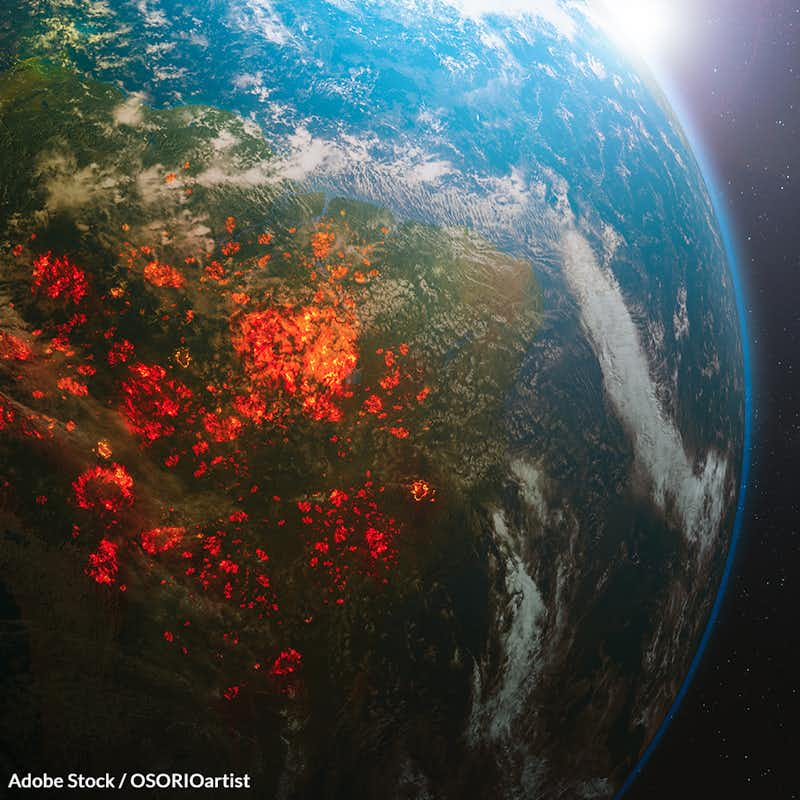Take the Rainforest Pledge
15,544 signatures toward our 30,000 Goal
Sponsor: The Rainforest Site
Rainforests are critically important to life on Earth and they are being destroyed at an alarming rate. Sign the pledge!

Rainforests cover less than 3% of the Earth's area, but they are essential to life on Earth1.
Rainforests absorb carbon dioxide and release the oxygen that we depend on for our survival. The absorption of this CO2 helps to stabilize the Earth's climate2.
Rainforests also help to maintain the world's water cycle by adding water to the atmosphere through the process of transpiration which creates clouds. Water generated in rainforests travels around the world; scientists think that moisture generated in the forests of Africa ends up falling as rain in the Americas3.
Rainforests can influence global weather, and are home to half of the world's terrestrial species4. A 10-square-kilometer (4-square-mile) patch can contain as many as 1,500 flowering plants, 750 species of trees, 400 species of birds and 150 species of butterflies5.
More than 25% of the medicines we use originate from rainforest plants6. Scientific study shows that tropical rainforest plants are a biologically and chemically diverse resource that can synthesize many organic molecules as defense agents against diseases, pests and predators7.
"They have been shown to be the source of chemicals of diverse structures with promising biological activities and perhaps the most valuable source of therapeutic agents due to their rich biodiversity," write researchers Ibrahim Jantan, Syed Nasir Abbas Bukhari, Mohamed Ali Seyed Mohamed, Lam Kok Wai and Mohammed Ahmed Mesaik.
Tropical rainforests are critically important to our world, containing the highest concentration of species, storing more carbon in aggregate than any other terrestrial ecosystem, and supporting most of the planet's "uncontacted" peoples8.
Despite their importance, deforestation in the world's tropical forests has remained persistently high since the 1980s9. Primary tropical forests have been destroyed at a rate of 3.2 million hectares a year since 200210.
Fires used to clear forest in the Amazon for livestock farming are now creating more CO2 than the Amazon is able to lock up11.
June 22 is World Rainforest Day12, which recognizes standing, healthy forests as one of the most powerful and cost-effective climate change mitigation tools we have — and creates a global movement to protect and restore them.
Take the World Rainforest Day Pledge and do your part to protect this critical resource!
- Rainforest Alliance (20 June 2019), "9 Rainforest Facts Everyone Should Know."
- Rainforest Trust (1 September 2017), "Climate Change Series Part 1 — Rainforests Absorb, Store Large Quantities of Carbon Dioxide."
- Rainforest Concern (2022), "Why are rainforests important?"
- Rainforest Trust (9 November 2021), "5 Ways Rainforests Mitigate Climate Change."
- National Geographic Society (2022), "Rainforest."
- PEFC (2022), "Celebrating our rainforests on World Rainforest Day."
- IntechOpen Limited (3 June 2015), "The Evolving Role of Natural Products from the Tropical Rainforests as a Replenishable Source of New Drug Leads."
- Rhett Butler, Mongabay (22 June 2020), "World Rainforest Day: The world's great rainforests."
- Our World in Data (19 February 2021), "Global deforestation peaked in the 1980s. Can we bring it to an end?"
- Earth.org (22 June 2021), "World Rainforest Day 2021: The World's Top 10 Greatest Rainforests."
- Craig Welch, National Geographic (11 March 2021), "First study of all Amazon greenhouse gases suggests the damaged forest is now worsening climate change."
- World Rainforest Day (2022), "World Rainforest Day 2022."
The Pledge:
On June 22, World Rainforest Day, and every other day of the year, I pledge to support the conservation of our world's rainforests by taking one or more of the following steps:
- Eat less meat.
Cattle farming greatly contributes to deforestation, as farmers clear-cut and burn millions of acres of former rainforest for grazing animals. Eating a meatless meal, even once a week, can help reduce this problem.
- Avoid palm oil.
Rainforests and countless wildlife habitats are being destroyed and replaced by palm farms at an alarming rate. Opting for other oils, and avoiding foods with palm oil listed as an ingredient, will reduce the demand for this crop.
- Contributing to conservation.
Your donations and purchases at GreaterGood help support efforts to save rainforests around the world.
- Plant a tree.
You can do the job yourself, or fund the planting of a tree through GreaterGood. Dedicate your tree in someone's honor, and watch it grow.
- Spread the word.
It doesn't take much to raise awareness about the need for rainforest preservation. Share the importance of rainforests with others in your networks, and help us save these critical resources!
Pledged by,